

Positive HR: Appreciative Inquiry. Key points Appreciative inquiry is an action research approach that offers a powerful contribution to meeting the appetite for real change that is evident across public services in Scotland.
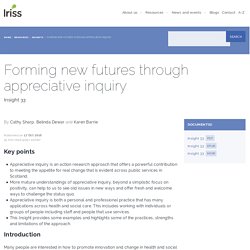
More mature understandings of appreciative inquiry, beyond a simplistic focus on positivity, can help to us to see old issues in new ways and offer fresh and welcome ways to challenge the status quo. Appreciative inquiry is both a personal and professional practice that has many applications across health and social care. This includes working with individuals or groups of people including staff and people that use services. This Insight provides some examples and highlights some of the practices, strengths and limitations of the approach. Introduction. Could One Question Uplift and Unite Humanity? [ TEDx : Jon Berghoff ] Try this anywhere [ TEDx : Robyn Stratton-Berkessel ] Five Questions That Will Add Value to Your Bottom Line.
Do you want to make savings and improvements in your business?
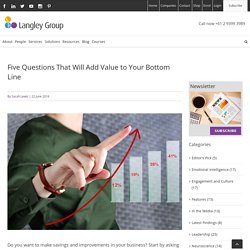
Start by asking the right questions. Asking good questions is an art that business leaders, owners and entrepreneurs sometimes forget as they strive to improve the bottom line. In the quest for ever greater efficiencies, productivity and general cost saving, a few key questions can reveal hidden costs and open up new avenues to increase performance and profitability. How can we learn from our best performers? An over-attachment to a view of organisations as a set of roles and role behaviours, with expected minimum standards of performance can blind us to the exceptional performance of our best staff.
For example Atul Gawande, a general surgeon, was interested to learn more about how an increase in life expectation for people with cystic fibrous had been achieved. Someone in your organisation demonstrating double the sales figures, or twice the academic success rate? Nine Principles for Co-Creating Culture Change. How do you help organisations achieve positive, rapid and sustainable change?
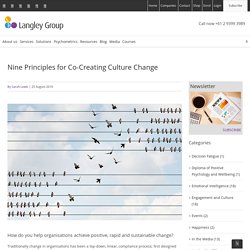
Traditionally change in organisations has been a top-down, linear, compliance process; first designed and then implemented. In today’s fast paced and complex world this takes too long and is too hard. People resist the pressure. Instead we need change that is whole-system owned and generated, focused on maximising tomorrow not fixing yesterday. To create that kind of positive, forward-thinking change we need to do it together. Co-creative approaches to organisational change such as Appreciative Inquiry, Open Space, and World Café have some very distinctive features that differentiate them from more familiar top-down planned approaches to change. Here are nine principles to guide co-creative change. Change is a many-to-many rather than one-to-many process. The world is socially constructed. Conversation is a dynamic process. Organisations are about patterns so changing organisations is about changing patterns.
Appreciative inquiry. Appreciative inquiry (AI) is a model that seeks to engage stakeholders in self-determined change.
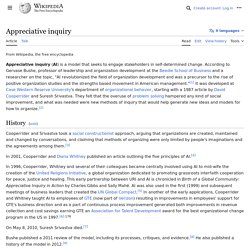
According to Bushe "AI revolutionized the field of organization development and was a precursor to the rise of positive organization studies and the strengths based movement in American management. "[1] It was developed at Case Western Reserve University's department of organizational behavior, starting with a 1987 article by David Cooperrider and Suresh Srivastva. They felt that the overuse of "problem solving" hampered any kind of social improvement, and what was needed were new methods of inquiry that would help generate new ideas and models for how to organize.[2] History[edit] Cooperrider and Srivastva took a social constructionist approach, arguing that organizations are created, maintained and changed by conversations, and claiming that methods of organizing were only limited by people's imaginations and the agreements among them.[3]
Positive Organizational Psychology. Personal Strengths. Competing Values. Design Thinking. Emotional Intelligence. Neuroscience. Systems Theory. Can You Create A Positive Disruption? How does your organization cope with change?
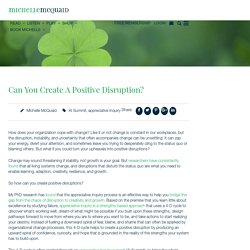
Like it or not change is constant in our workplaces, but the disruption, instability, and uncertainty that often accompanies change can be unsettling. It can zap your energy, divert your attention, and sometimes leave you trying to desperately cling to the status quo or blaming others. But what if you could turn your upheavals into positive disruptions? Change may sound threatening if stability, not growth is your goal. But researchers have consistently found that all living systems change, and disruptions that disturb the status quo are what you need to enable learning, adaption, creativity, resilience, and growth.
Appreciative Inquiry Cards. Your brain is wired with a negativity bias that makes you fabulous at spotting all the things that are not going well – but it’s not generally as adept at spotting the true, the good, and the possible, and finding ways to build upon what’s working.
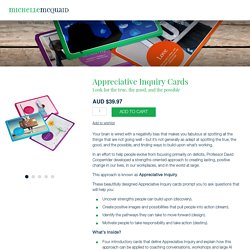
In an effort to help people evolve from focusing primarily on deficits, Professor David Cooperrider developed a strengths-oriented approach to creating lasting, positive change in our lives, in our workplaces, and in the world at large. This approach is known as Appreciative Inquiry. These beautifully designed Appreciative Inquiry cards prompt you to ask questions that will help you: Uncover strengths people can build upon (discovery).Create positive images and possibilities that pull people into action (dream).Identify the pathways they can take to move forward (design).Motivate people to take responsibility and take action (destiny). What’s Inside? Click the green “Add to Cart” button above to buy your cards today.
Podcasts. Appreciative Inquiry. Flourishing Leadership Institue.